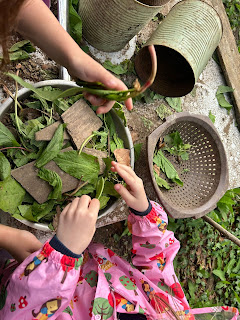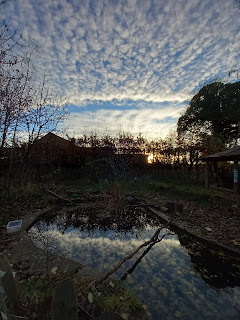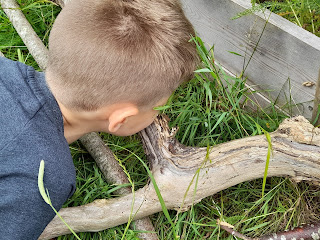Simplicity
When it comes to providing activities and experiences in Forest School we try hard to stick to things that we COULDN'T do inside.
This isn't a hard and fast rule, but it is guidance. Taking lots of equipment outdoors doesn't feel child led, nor does it feel too much like Forest School.
There will always be information to access and equipment to support exploring, but beyond reference books and sheets, magnifiers, binoculars, and bug pots very little is a staple.
Tools are available, that can just be yarn and scissors, peelers, palm drills, or something that needs much closer supervision. There are digging areas and mudkitchens on each site, swings, and platforms, as well as access to climbing.
We do offer opportunities to weave, tie knots, create a nature table, and plant. We may suggest den building or hide and seek. We will respond to requests for litter-pickers, or pond dipping, or whatever activity on site we can accommodate, with support and with equipment.
When a child shows and interest in something we will foster it, guide it (if need be), and facilitate it to the best of our ability.
This usually means a crash course in flint, or spiders, or the properties of Elder wood for us. We try to ensure that at the next session we are able to move their interest along and extend their learning. The places they lead us with interests in egg shells, arachnids, dandelions, etc, increases our own knowledge, and our ability to add new aspects to our practice moving forward.
We increase their learning and they increase ours.
Mostly we focus on developing and strengthening skills. Life skills mostly: listening, relationships, communication, curiosity, safety, self-esteem, motivation, and confidence, amongst other things.
Skills that need exercise and development and transfer back into the classroom as well as, hopefully, influence their future in and out of education.
We've all seen the quiet child in class become loud and proud outside, the child who struggles to be still or concentrate become focused on a self chosen task, or the child who doesn't really have a large friend group enthrall classmates with their prior knowledge of nature.
Going outside removes the walls and frees the child to be who they are, not who they are required to be to succeed within a narrow curriculum.
Keeping activities simple allows the children to embelish on them, to wander along learning paths that we didn't know existed! To wholeheartedly immerse themselves in something they have a genuine interest in, something they can explore and investigate as much or as little as they choose, at whatever pace they wish.
We will always encourage their interest, we'll hint and question innocently, drawing out whatever knowledge they have, while steering them towards answers they can 'discover' for themselves.
From the outside it may look like we're doing very little, while, like the gliding Swan, we're working hard beneath the surface!
There will always be times where we DO take an activity outdoors, we'd rather find an alternative, like crushing charcoal to make paint rather than taking squeezy bottles of poster paint outside, but sometimes there's no choice. We aim to keep these few and far between to keep learning outdoors as different to learning indoors as we can.
Observing the children means we know when to reinforce or challenge what they are exploring. We judge how to move them on to the next stage, like showing a child how to walk, working with them through rolling and crawling, we know what stage they are at and how to develop their interest further. Rather than encouraging motor skills we're enticing cognitive skill!
As the year turns and the weather warms and the season affords us more experiences to utilise, the simplicity of using leaves and mud and grass is thanks to the complex and varied wonders of nature!
The assorted life cycles of wildlife. The amazing burst of new life on bushes and trees. The increasing activity of birds and fauna all around...
It all works with us to reconnect children with their place in nature.
And I've never known a child not to embrace it.










Comments
Post a Comment